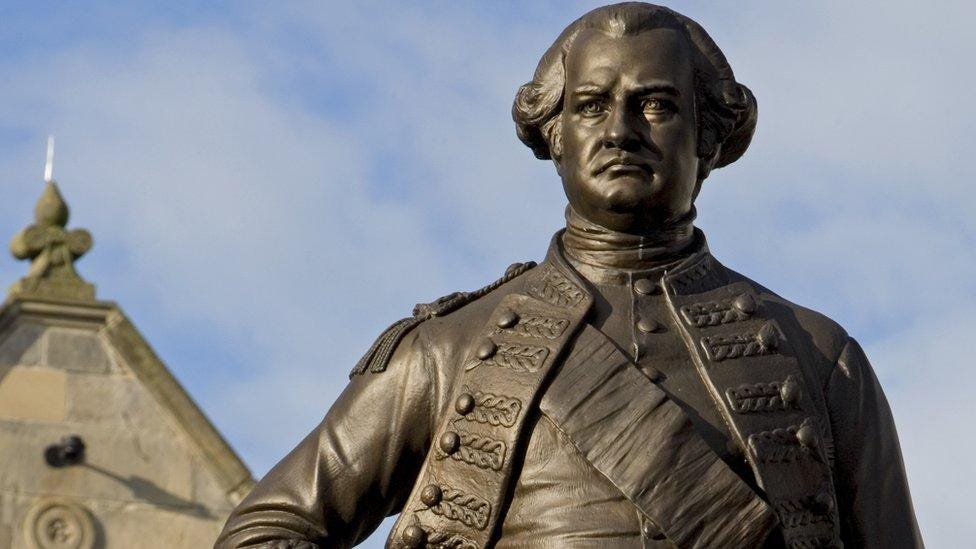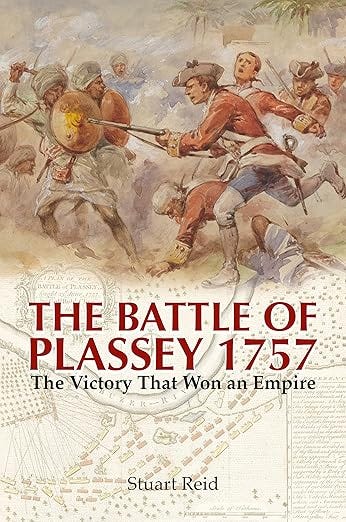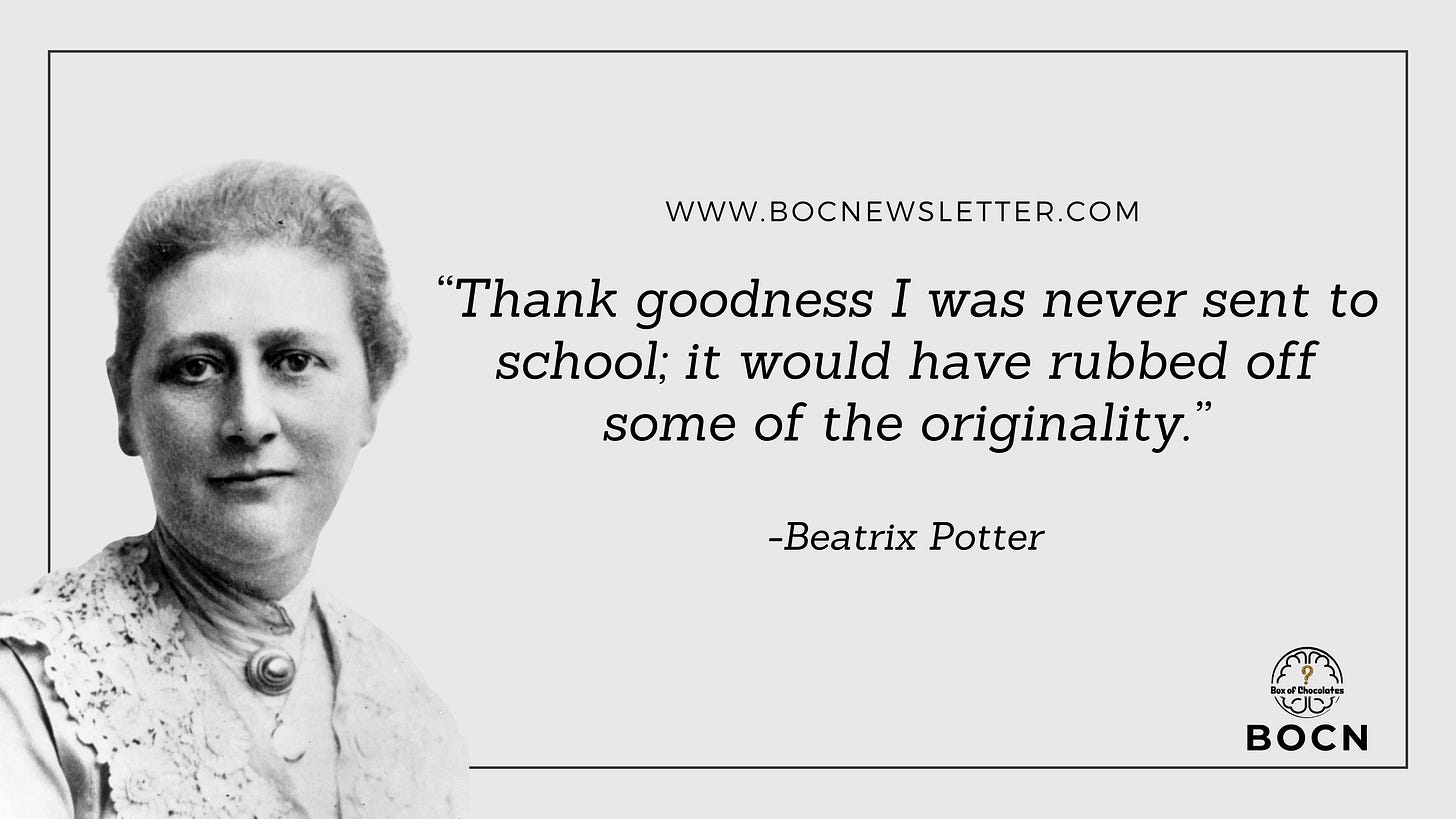The Man Who Stole India.
The East India Company, Frowzy, Gandhi, and Beatrix Potter
BOC#030
5 MINUTE MUNCH
TITLE STORY: THE RISE OF ROBERT CLIVE
The East India Company consisted of four classes: Senior merchants, junior merchants, traders, and servile clerks. Robert Clive occupied the lowest of these mercantile rungs, seeing him take care of bills, receipts, and Company inventory. In spite of his banal role at the Company, he kept his faculties intact by spending his evenings at the governor’s mansion library where he read the likes of Bacon, Descartes, Confucius, Hobbs, and Machiavelli.
Born to a lower-middle-class english family, Clive is said to have had trouble getting on with fellow students at school. He, like Richard Francis Burton who we met last week, was somewhat of a ruffian who caused undue panic having climbed a church steeple, and it didn't end there. As a teenager, he led a gang that threatened to smash shop windows should the owners fail to pay ‘protection money’. Being the delinquent that he was, then, joining the East India Company at 17 was probably just what a boy of his unruly nature was in need of.
He didn’t enjoy his time at the Company initially, and found himself indebted to the captain of the ship that had delivered him to India. With no return correspondence from his family and likely bouts of depression, Clive pressed his pistol against his temple and pulled the trigger twice. Neither shot fired, and the timely arrival of a friend brought the sorry episode to an abrupt, albeit telling end.
Clive, now a depressed, suicidal, indebted, young clerk surrounded by the temptation of opium and alcohol abuse, paired with the ever present threats of fevers and diarrhea, went on to become one of the highest ranking officers in the East India Company, not to mention, one of England’s richest men.
FROM RAGS TO RICHES…
Clive arrived in Madras in 1744 to a backdrop of British and French competition for the subcontinent. Upon his arrival, the Company was a fragmented trading operation. By the time he left India in 1767, he had transformed it into a territorial power with its own military force. The Company came to account for 20% of all imports to Britain, and had only failed to pay dividends to shareholders twice between the years of 1709 and 1748.
Clive was once amongst a party of captured Brits who were paraded through the town square following a successful French attack on Fort St. George, Madras, in 1746. A few nights later, with the help of some locals, he escaped capture dressed in Indian garments wearing dark face paint so as to appear native. The escapees then travelled fifty miles to the British outpost of Fort St. David. Enthused by this experience, Clive spent the next year studying the art of soldiering under Major Stringer Lawrence, and eventually led a platoon that fought off a string of French attacks that saw him rise to the rank of lieutenant. Over the next decade, Clive continued to engage the French in a continuum of skirmishes, the most famous of which was his victory at the Battle of Arcot during the Second Carnatic war of 1751.
In 1753 Clive and his wife Margaret Maskelyne decided to return to London, but were back aboard a ship headed for Madras two years later. Clive, who had now been made a lieutenant colonel, was sent back with the goal of ridding central India of the French. It was during this second tour that Clive led the Company to a further infamous victory at the Battle of Plassey in 1757. The British thus emerged as the rulers of Bengal, with Clive administering the wealthiest province of India, home to forty million people. The Company’s London based directors named him governor of the Calcutta branch of the East India Company. This also made him governor of Calcutta, political proconsul of Bengal, and supreme military commander of both. Following the Battle of Plassey, Prime Minister William Pitt the elder said of Clive:
‘We had lost our glory, honour, and reputation everywhere but India: there the country had a heaven-born general, who had never learned the art of war, nor was his name enrolled among the great officers who had for many years received their country’s pay; yet was he not afraid to attack a numerous army with a handful of men.’
Clive had established British dominance in India, and was honored with the title of ‘Flower of the Empire, Defender of the Country, the Brave, Firm in War’ by Mir Jafar entitling him to a salary for life. The lifelong revenue he would go on to receive ruffled Company feathers, however, as the funds themselves were the monies paid by the Company on land in Calcutta. In short, Clive had essentially become the Company’s landlord. On his return to England in 1760, he received an audience with King George II, collected an honorary degree from Oxford, and was elected to Parliament. He was subsequently known as ‘Clive of India.’
In 1764 as Clive neared forty, the Company sent him back to India to ‘clean things up’. He set about restructuring the way things were done, and introduced a regular postal system helping to establish better departmental connections.
In 1772 a Parliament driven inquest reviewed Company practices in India with a special spotlight on Clive. While he was exonerated, his reputation was tarnished. In 1774 he took his own life.
DID YOU KNOW…
The East India Company, founded by a group of British entrepreneurs, was establish as ‘the Company of Merchants of London Trading in the East Indies’. It was officially established by Queen Elizabeth in 1600, but it was King Charles II who gave the Company rights beyond just trade. He permitted ‘the Company’ to acquire territory, mint money, raise armies, and exercise civil and criminal jurisdiction over its personnel. It’s aims were to dominate global economic competition. It’s goals were best described by Elizabethan statesman Sir Walter Raleigh who said:
"For whosoever commands the sea commands the trade; whosoever commands the trade of the world commands the riches of the world, and consequently the world itself."
ON THIS DAY: 28th JULY
The United Kingdom announced that it would start using postal codes today in 1959, Norwich was the first city to trial them.
The devastating Great Tangshan earthquake of China occurred today in 1976, almost a quarter of a million people, possibly 3 times more, lost their lives.
Today in 1914, Austro-Hungarian Franz Joseph signed an official declaration of war against Serbia, triggering the First World War.
Today is National Milk Chocolate Day in the U.S - Behave yourselves!
“I will not let anyone walk through my mind with their dirty feet.”
― Mahatma Gandhi
FROWSTY VS FROWZY
The first means musty or stale. The second means untidy or dingy.
FROM THE AUTHORS MOUTH:
The English author Beatrix Potter, best known for the children's book The Tale of Peter Rabbit, was born today in 1866 in London. Did you Know Beatrix didn’t go to school, but was privately educated at home. Being the conservationist that she was, Potter left some 4,000 acres of land and 15 farms to the National Trust when she died in 1943.
MISSED LAST WEEK? Read Here: The Man Behind the Arabian Nights and Kama the Sutra, Richard Francis Burton.
[Links marked with * are affiliate links]












Fascinating life! Clive was a clue on Jeopardy just last night, and meow I know who he is. Interesting and sad that he tried to kill him self before he made a career for himself, and then at the end of his career, he succeeded in that. Mental illness is timeless i guess-it'll get the best of us. Thanks for telling that story!